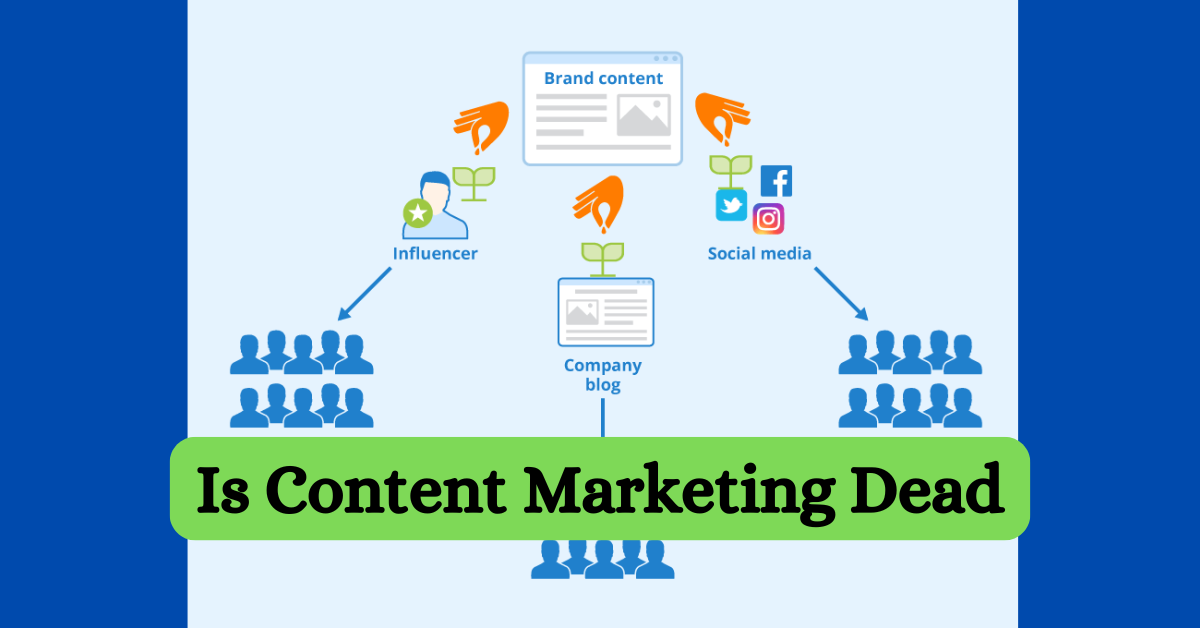Introduction:
If you’ve been asking yourself, “Is content marketing dead?” you’re not alone. Many businesses and marketers are feeling frustrated, wondering if their content efforts are still worth the time, energy, and investment. With the digital landscape changing faster than ever, it’s easy to feel that traditional content marketing approaches may be losing their impact.
But the answer to this question isn’t as simple as “yes” or “no.” Content marketing has evolved—dramatically. In this article, we’ll explore why some think content marketing is “dying,” how it has adapted to today’s consumer expectations, and what tactics are working right now.

Why Some Say Content Marketing is “Dead”:
Over the last decade, content marketing has gone from an emerging trend to a cornerstone of most digital strategies. However, several factors have led to speculation that content marketing may no longer be effective. Let’s break down the major reasons behind this perception.
- Oversaturation of Content
The internet is flooded with content—over 7.5 million blog posts are published daily. With so much content available, it’s harder for individual pieces to stand out. Audiences are now more selective about the content they engage with, expecting higher-quality, personalized, and unique perspectives. - Changes in Algorithms and Search Intent
Search engines and social media platforms are constantly updating algorithms, making it harder for organic content to reach a wide audience. Google’s focus on expertise, authoritativeness, and trustworthiness (E-A-T) has also pushed out low-value content, requiring more specialized, authoritative input. - Decline in Organic Reach on Social Media
Social media platforms like Facebook and Instagram have drastically reduced organic reach, encouraging brands to pay for visibility. This pay-to-play model can be discouraging for companies that relied heavily on organic content marketing. - Audience Shifts Toward New Media
Users are increasingly gravitating toward video, podcasts, and social media content over traditional blog posts and articles. Platforms like TikTok and YouTube have changed how people consume information, prioritizing short, visual content over long-form articles.
Why Content Marketing Is Not Dead—But Different:
Despite these challenges, content marketing is far from dead. It has simply evolved, with new tactics and approaches replacing older strategies that no longer resonate. Here’s why content marketing still matters in 2024 and beyond.
- Quality Over Quantity
Today, it’s less about producing a high volume of content and more about producing content that truly resonates with your target audience. High-quality, well-researched, and actionable content tends to perform better, often leading to higher engagement and conversions. - Emphasis on Personalization and Audience-Centric Content
Consumers now expect content that speaks directly to their needs and pain points. Brands that succeed are those that focus on personalization, creating content tailored to niche audiences rather than broad, one-size-fits-all messages. - The Power of Storytelling
Storytelling remains one of the most effective ways to connect with audiences on an emotional level. Content that tells a compelling story or provides an authentic, relatable perspective can build trust and keep users engaged longer. - Leveraging Multiple Formats and Channels
Effective content marketing today involves a multi-channel approach. Repurposing content into various formats—blogs, videos, infographics, podcasts—allows brands to reach different audience segments where they spend the most time. - Focus on Value-Driven and Educational Content
Today’s consumers are looking for value. Brands that provide in-depth, valuable, and actionable content can still build strong, lasting relationships with their audience. Tutorials, guides, and case studies often perform well, establishing a brand as an authority in its field.
The Content Marketing Tactics That Work Today:
If you’re ready to evolve your content marketing strategy, here are some tactics that are proving effective right now:
- Optimize for User Intent and Search Intent
Understanding user intent has become crucial. Create content that matches what users are looking for, whether it’s informational, navigational, or transactional, to improve search rankings and engagement. - Invest in Video and Interactive Content
Video marketing, interactive quizzes, and tools offer a way to capture attention and engage users in new ways. Platforms like YouTube, TikTok, and Instagram Stories can help brands reach younger audiences who prefer visual content. - Focus on SEO and Topic Clusters
Organizing content into clusters around core topics helps build SEO authority, improves ranking, and makes it easier for readers to find related content. This strategy aligns with Google’s prioritization of expertise and topic authority. - Embrace Content Collaboration and Influencer Marketing
Collaborations with influencers and experts can amplify content reach and credibility. Partnering with industry thought leaders to co-create content can extend visibility and establish authority. - Measure, Optimize, and Refine Continuously
Effective content marketing today involves data-driven optimization. Tools like Google Analytics, SEMrush, and Ahrefs can provide valuable insights into what works and what doesn’t, allowing for continuous improvement and adaptability.
Final Thoughts:
Content marketing isn’t dead, but it has transformed. It requires more strategy, higher quality, and adaptability to stay relevant in today’s dynamic digital landscape. For those willing to evolve their approach—focusing on value, storytelling, personalization, and data-driven optimization—content marketing remains a powerful tool to connect, engage, and convert audiences.




